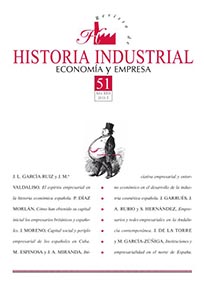«Padre bodeguero, hijo caballero»: Social capital and the business trajectory of the spanish in Cuba, 1898-1958
Keywords:
Immigration, business success, Spanish minorities, social capital, Economic History of CubaAbstract
In this study an effort is made to explain the keys to the business success of Spanish immigrants in Cuba in the first half of the twentieth century, using as its basis the theoretical developments in social capital. The text measures the extent of this greater business luck with respect to economic opportunities in Spain, describes the professional integration process in Cuba and even quantifies the degree of integration of women in the world of work. Furthermore, a revision is made of the keys to this success and the business weaknesses attributed to the Spanish are questioned in light of those keys: economies of enclave created by the Spanish minorities themselves, institutions that were even stronger than the Cuban ones —typical of those of a weak state in construction— along with the solidarity that their common citizenship offered them.Downloads
Downloads
Published
How to Cite
Issue
Section
License
We have been applying a Creative Commons Attribution license (CC-BY) since 2019, before that year we had a partial open access policy, which included open access for the first two months after publication, followed by an embargo policy for non-subscribers, as access to the last 4 published issues was restricted to journal subscribers. In contrast, early-view articles were always open access prior to publication in an assigned volume. Until 2024 the access to the last 4 published numbers was restricted to those who were subscripted to the journal.
The author assigns all rights to the publisher. Creative Commons
The author who publishes in this journal agrees to the following terms:
- The author assigns all intellectual property rights exclusively to the publisher for the entire duration of the applicable intellectual property rights.
- The publisher will distribute the texts under the Creative Commons Attribution License, which allows others to share the work, provided that they acknowledge the authorship, its initial publication in this journal, and the conditions of the license.





